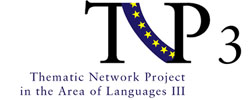
The purpose of this questionnaire is to survey the opinions and experiences of European university graduates regarding the kinds of language and communication related skills that are needed in today’s internationalised workplaces and for career development. Your answers are extremely valuable for directing and updating language programmes offered at the university level to both language graduates and to students specialising in other fields. This is your unique chance to have an impact on how workplace communication skills could and should be developed in higher education in order to provide a good basis for developing actual workplace-specific communication skills and a competitive edge in employability. A similar survey will also be conducted among European employers.